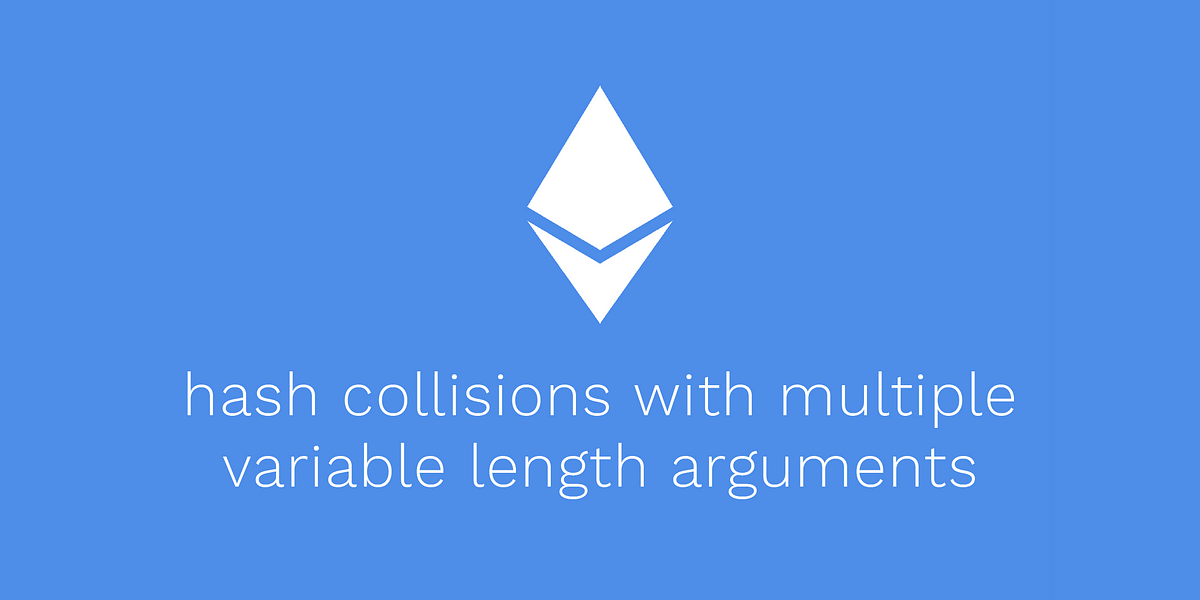Golang Equivalent to Solidity abi.encodePacked
Learn how to replicate the functionality of Solidity's abi.encodePacked for data packing in your Golang projects.
Learn how to replicate the functionality of Solidity's abi.encodePacked for data packing in your Golang projects.
In Solidity, understanding the difference between abi.encodePacked() and abi.encode() is crucial for secure data hashing. While both functions prepare data for the Ethereum Virtual Machine (EVM), they differ in padding, which directly impacts hash collision resistance. This discrepancy becomes particularly important when interacting with external systems like Go, where data packing might not align with Solidity's abi.encodePacked(). Let's explore how to achieve consistent hashing between Solidity and Go despite these differences.
Solidity's abi.encodePacked() packs data tightly without padding, unlike abi.encode(), which uses 32-byte padding. This difference matters for hash collisions.
keccak256(abi.encodePacked("a", "b"))
keccak256(abi.encode("a", "b")) Go's arguments.Pack is similar to abi.encode, not abi.encodePacked. For consistent hashing between Solidity and Go:
Use a library like ethers.js: It offers functions like ethers.utils.solidityPack that mimic Solidity's abi.encodePacked.
ethers.utils.solidityPack(["string", "string"], ["a", "b"])Implement your own packing logic: Ensure it replicates Solidity's tight packing rules.
Caution: While abi.encodePacked is space-efficient, it's vulnerable to hash collisions if the data isn't carefully structured. Use it when you're sure about data types and their order to avoid potential security risks.
This code demonstrates the difference between Solidity's abi.encode and abi.encodePacked for hashing and how to achieve consistent hashing with Go using ethers.js. It provides Solidity and Go code examples for hashing strings with both methods. The Go code utilizes the abi.EncodePacked function from the github.com/umbracle/ethgo/abi library to replicate ethers.js's solidityPack functionality for consistent tight packing. The output of the Go code will match the hash generated by Solidity's hashWithEncodePacked function, showcasing consistent hashing between the two. The code highlights the importance of using a tight packing method like abi.encodePacked or its equivalent for consistent hashing between Solidity and Go. However, it also cautions against potential hash collisions when using abi.encodePacked and recommends careful consideration of data types and their order to mitigate security risks.
This example demonstrates the differences between abi.encode and abi.encodePacked in Solidity, and how to achieve consistent hashing with Go using ethers.js.
Solidity (example.sol):
pragma solidity ^0.8.0;
contract HashingExample {
function hashWithEncode(string memory str1, string memory str2) public pure returns (bytes32) {
return keccak256(abi.encode(str1, str2));
}
function hashWithEncodePacked(string memory str1, string memory str2) public pure returns (bytes32) {
return keccak256(abi.encodePacked(str1, str2));
}
}Go (main.go):
package main
import (
"fmt"
"github.com/ethereum/go-ethereum/crypto"
"github.com/ethereum/go-ethereum/common/hexutil"
"github.com/umbracle/ethgo/abi"
)
func main() {
// Simulating Solidity's abi.encodePacked in Go using ethers.js solidityPack equivalent
packedData, _ := abi.EncodePacked(
abi.MustNewType("string"), "a",
abi.MustNewType("string"), "b",
)
goPackedHash := crypto.Keccak256Hash(packedData)
fmt.Println("Go (ethers.js solidityPack equivalent):", hexutil.Encode(goPackedHash[:]))
}Explanation:
Solidity:
hashWithEncode uses abi.encode, which pads data to 32 bytes.hashWithEncodePacked uses abi.encodePacked, packing data tightly without padding.Go:
abi.EncodePacked from github.com/umbracle/ethgo/abi to mimic ethers.js's solidityPack functionality. This ensures consistent tight packing with Solidity's abi.encodePacked.crypto.Keccak256Hash calculates the Keccak256 hash of the packed data.Running the code:
Output:
The Go code will print a Keccak256 hash that matches the output of hashWithEncodePacked in your Solidity contract, demonstrating consistent hashing between Go and Solidity when using a tight packing method like abi.encodePacked or its equivalent.
Important Note:
Remember that while abi.encodePacked and its equivalents are space-efficient, they are vulnerable to hash collisions if the data structure is not carefully considered. Use them cautiously and only when you are certain about the data types and their order to avoid potential security risks.
abi.encodePacked():
abi.encode(): While less space-efficient, it's generally safer due to padding.github.com/umbracle/ethgo/abi, other Go libraries might offer similar packing functions. Always verify their implementation aligns with Solidity's abi.encodePacked() to ensure consistency.abi.encodePacked(), to minimize collision vulnerabilities. Consider using fuzzing techniques to test with a wide range of inputs.abi.encodePacked() might have subtle differences across Solidity versions. Always refer to the documentation of the specific version you're using.abi.encodePacked() can save gas due to its compact encoding, the gas savings might be negligible in many cases compared to the potential security risks. Prioritize security over minor gas optimizations.| Feature | abi.encodePacked() |
abi.encode() |
Go Equivalent |
|---|---|---|---|
| Data Packing | Tight packing, no padding | 32-byte padding | Similar to abi.encode
|
| Hash Collisions | Vulnerable if data structure is not carefully considered | Less prone | |
| Go Implementation | arguments.Pack |
||
| Achieving Solidity Consistency in Go | 1. Use libraries like ethers.js (e.g., ethers.utils.solidityPack) 2. Implement custom packing logic mimicking Solidity |
Key Takeaways:
abi.encodePacked() for space efficiency, but be cautious of potential hash collisions.abi.encodePacked().ethers.js or implement custom packing logic that mirrors Solidity's behavior.When working with Solidity and external systems like Go, achieving consistent hashing requires a nuanced understanding of data packing. While Solidity's abi.encodePacked() offers space efficiency, its susceptibility to hash collisions necessitates careful consideration of data types and order. For reliable cross-platform hashing, leveraging libraries like ethers.js or implementing custom packing logic that mirrors abi.encodePacked() is essential. Prioritizing security over marginal gas optimizations and thoroughly testing hashing logic, especially when using abi.encodePacked(), are crucial steps in developing secure and reliable blockchain applications.
 Contract ABI Specification — Solidity 0.8.29 documentation | This encoding is also used in other places, e.g. the return values and also ... same value. Errors . In case of a failure inside a contract, the ...
Contract ABI Specification — Solidity 0.8.29 documentation | This encoding is also used in other places, e.g. the return values and also ... same value. Errors . In case of a failure inside a contract, the ...abi.encodePacked in Golang. How can I get the same return value as solidity abi encodePacked in ... | How can i run abi.encodePacked in golang? In solidity i use keccak256(abi.encodePacked(a, b)) to ... (abi.encodePacked(receiver, id, amount)); } }
How can I get the same return value as solidity abi encodePacked in ... | How can i run abi.encodePacked in golang? In solidity i use keccak256(abi.encodePacked(a, b)) to ... (abi.encodePacked(receiver, id, amount)); } } abi.encode, abi.encodePacked, and abi.decode in Solidity | by ... | In Solidity, several key functions for encoding and decoding data are abi.encode, encodePacked decode string.concat ,bytes.concat and…
abi.encode, abi.encodePacked, and abi.decode in Solidity | by ... | In Solidity, several key functions for encoding and decoding data are abi.encode, encodePacked decode string.concat ,bytes.concat and… New Smart Contract Weakness: Hash Collisions With Multiple ... | It’s important that you carefully consider whether you can
New Smart Contract Weakness: Hash Collisions With Multiple ... | It’s important that you carefully consider whether you cankeccak256(abi.encode(...)) · Issue ... | I spent a long time figuring out why I could not get matching hashes between Solidity and Ethers using the solidityKeccak256 function with dynamic types (i.e. string). Example Solidity contract: pr...